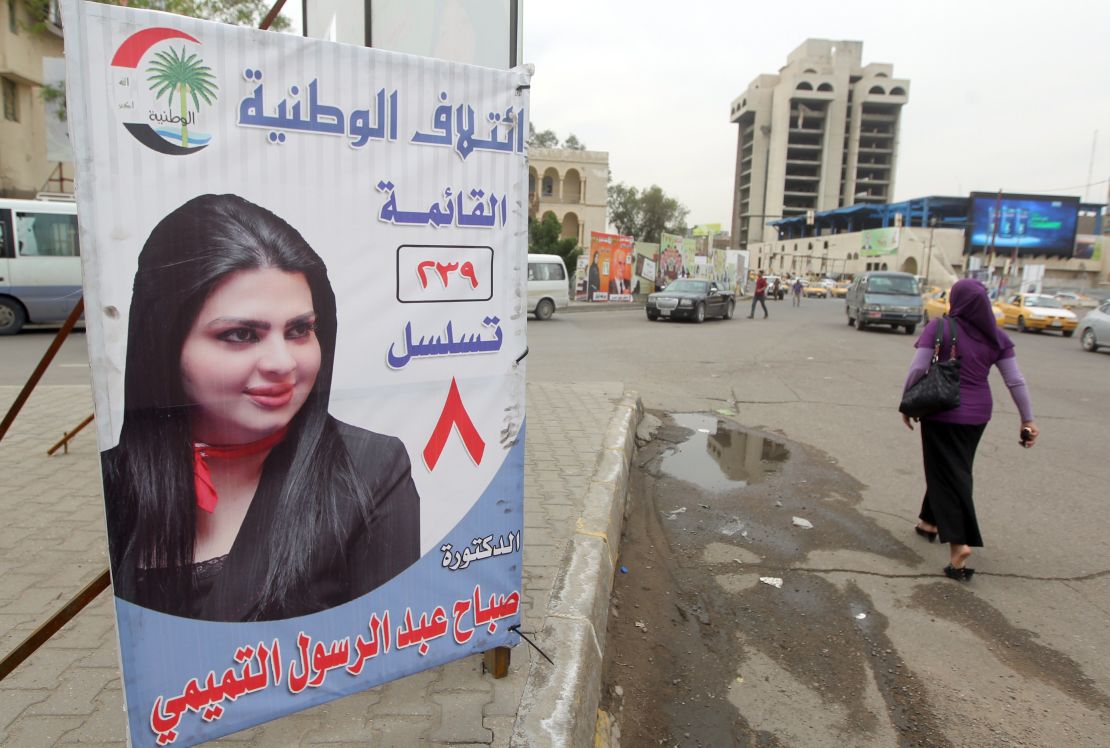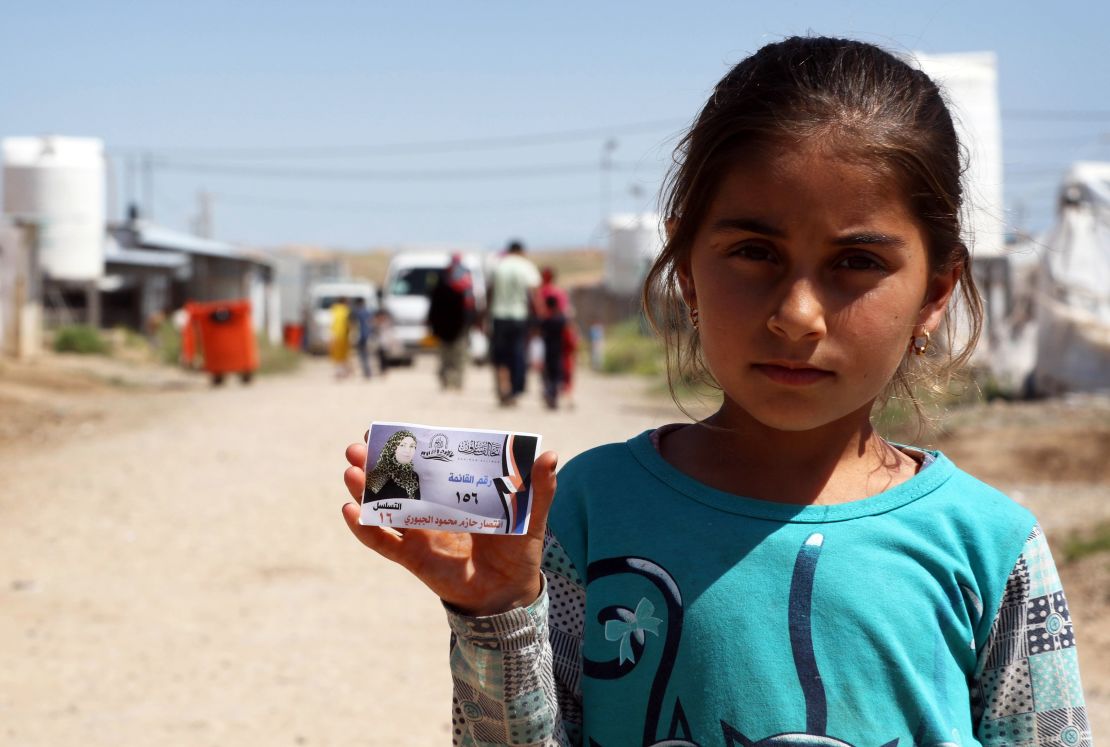Whatever the outcome of Iraq’s May 12 parliamentary elections, female candidates are guaranteed at least 25% of the seats, as per the country’s constitution.
This year, nearly 2,600 female candidates are competing for a minimum of 83 seats reserved for women in the national parliament. Theoretically, Iraqi women could occupy positions outside the “quota seats,” if they receive enough votes to win competitive seats.
However, statistics from the Inter-Parliamentary Union (IPU) show that since the quota was introduced after the toppling of the Saddam Hussein regime in 2003, women have not won enough votes to be elected beyond this quota.
Furthermore, in the lead up to the May election, a number of female candidates have been the target of “defamation campaigns,” according to the UN, pressuring them to withdraw from the race.
‘People have faith in women’
Two of the Iraqi women running in this election, Sabah Abdul Rasul Al Tamimi and Manal Almotasim, spoke to CNN, saying they are optimistic that opinions toward female political candidates in Iraq are changing.
Al Tamimi served as a member of the National Parliamentary Bloc for four years, from 2010 to 2014, and is running again this time around. She believes the 25% quota, while insufficient, is still important.
“This is a sign that people have faith in women and I know their consciousness (of women) will continue to increase,” she tells CNN. “In the future, men will probably be needing a quota for themselves!”

Almotasim, a former Iraqi journalist, is a candidate for the Qarar Al-Iraqi Coalition. She sees a more women-conscious Iraqi society on the horizon, and says her candidacy has garnered nothing but positive reactions, despite the country’s traditionalist fabric.
“Iraq is a conservative society – always has been, still is and always will be,” Almotasim tells CNN. “The issue of women is a sensitive one, but this time around society wants to see us get up there.”
She says, however, that the 25% quota does not accurately represent the contribution Iraqi women make to society. “The reason we are pushing for women to enter parliament is because women undoubtedly understand women more than men do,” she says.
For decades, Iraq was considered one of the most progressive countries in the Middle East for women. However, many of those advances have rolled back since 2003, according to the United Nations Development Programme.
Despite the constitutional requirement for female representation in parliament, Iraq trails behind other countries in the Middle East on critical indicators, such as gender-based violence.
Almotasim sees this election as a chance to bring to the fore issues related to women, such as compensation for those who have suffered from conflict.
Al Tamimi, however, says she found that during her time in parliament, the laws put in place concerning women’s rights were ineffective. “We don’t want laws, we don’t want conferences, we want action,” she says.

‘Ceiling for female representation’
Marwa Shalaby, a fellow for the Middle East at Rice University’s Baker Institute in Texas, United States, says that while gender quotas are a step in the right direction, she is discouraged by the fact that women in Iraq are not winning more seats.
“(The quota) did a great job in promoting women in office and getting them into parliament,” Shalaby tells CNN. “But the problem is when women are not able to exceed this 25%. It’s putting more of a ceiling for female representation.”
Iraq has one of the highest proportions of female representation in parliament in the Middle East. By means of comparison, in the United States, women hold 19% of seats in Congress, according to IPU statistics.
According to Iraq’s electoral law, if female candidates do not secure sufficient votes to win seats, party leaders will select those female candidates with the most votes to be included in the final list of winners for each governorate.
This was the case in the 2010 election, when only five female MPs gained enough votes to win their seats outright. To fill the quota, a further 81 female candidates were allotted seats according to the Institute of Democracy and Electoral Assistance.
“To me, this is not good enough: Quotas need to change perceptions, too,” says Shalaby. “We should be seeing more and more women coming into parliament by competition, too.”
Access to power in the Arab world
Iraq is not the only country using gender quotas to level the playing field in politics.
Approximately half of the countries in the world today use some form of electoral quota for their parliament, according to the Institute for Democracy and Electoral Assistance.
Following the Arab uprisings in 2010, several countries in the Middle East and North Africa – including Tunisia, Algeria, Egypt and Morocco – introduced gender parity clauses and quotas.
“(In the Arab world), we went from about 10% female representation in 2010 to close to 20% in 2017,” explains Shalaby. “We doubled in five years because these institutional mechanisms were introduced.”
Countries like Algeria and Tunisia in the Maghreb region have taken significant strides to reach gender parity in parliament, said Shalaby. But in Kuwait, for example, there is currently only one woman in parliament.
“We find that in countries that don’t have quota systems, women are not getting access to power,” she added.
Window dressing or real change for women?
Shalaby notes, however, that numerical representation in parliament doesn’t necessarily translate to real change for women.
After analyzing data from Jordan, Kuwait, Morocco and Tunisia, Shalaby found female MPs in Jordan, Kuwait and, to some extent, Morocco were not raising parliamentary questions on issues that touch women’s lives, such as domestic violence, honor crimes and unequal wages.
But this was not the case in Tunisia, she says, where a sufficient amount of women in power were able to work together to pass important laws concerning domestic violence.
In Iraq, it will be even harder for female MPs to push for change, says Shalaby.
“Iraqi women in parliament will be facing a very difficult task of enforcing women’s-related legislation or policies because of the political instability and corruption,” she says.
“We know this in the Middle East from decades of conflict. Every time women push for change, if there’s some kind of national struggle going on, women’s issues are always put on the side.”


